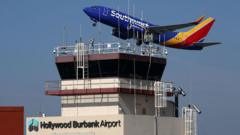Air Canada flight attendants have historically not been compensated for tasks performed on the ground, such as boarding and cabin checks, unlike their European counterparts. This inequity sparked urgent demands for change, particularly as many crew members reportedly worked around 40 hours a month for free. The union's efforts not only resulted in flights resuming but also paved the way for potential industry-wide standards.
The dissatisfaction among some attendants highlights ongoing concerns, as many remain skeptical about the adequacy of the proposed deal. Still, experts suggest that Air Canada’s actions might set a new precedent for compensation practices across North America, influencing other regional airlines like Air Transat and WestJet, who are preparing for their own negotiations.
The discussions come amid a broader climate of evolving labor rights within Canada, propelled further by the pandemic's impact on job duties. The public's empathy towards the flight attendants arguably shifted the dynamics of the negotiation, as many felt that addressing unpaid labor practices was long overdue in the airline industry.
As the Air Canada union continues to advocate for its workers, industry observers remain watchful of the potential changes this landmark deal could bring to labor relations in aviation, thereby fostering a climate where workers' rights and fair compensation take center stage.
The dissatisfaction among some attendants highlights ongoing concerns, as many remain skeptical about the adequacy of the proposed deal. Still, experts suggest that Air Canada’s actions might set a new precedent for compensation practices across North America, influencing other regional airlines like Air Transat and WestJet, who are preparing for their own negotiations.
The discussions come amid a broader climate of evolving labor rights within Canada, propelled further by the pandemic's impact on job duties. The public's empathy towards the flight attendants arguably shifted the dynamics of the negotiation, as many felt that addressing unpaid labor practices was long overdue in the airline industry.
As the Air Canada union continues to advocate for its workers, industry observers remain watchful of the potential changes this landmark deal could bring to labor relations in aviation, thereby fostering a climate where workers' rights and fair compensation take center stage.






















